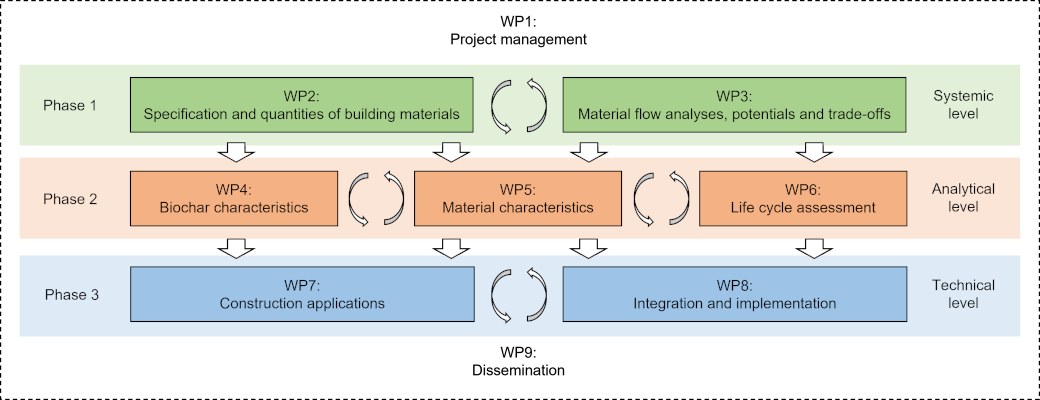BIOCHARm - Assessing the Potential of Biochar in Construction as a Contribution to Climate Neutrality
Short Description
Starting point / motivation
To achieve the Paris climate targets, greenhouse gas emissions must be drastically reduced and additional carbon must be removed from the atmosphere through so-called carbon removals, i.e. negative emissions, and permanently stored on the earth's surface or underground. One solution for the permanent removal of carbon from the atmosphere is biochar.
Biochar is a porous, solid carbon material that is produced by thermochemical conversion of biomass under exclusion of oxygen and exhibits numerous positive material properties. However, there are still numerous open questions regarding the use of biochar in the construction sector and the associated effects, which are the central motivation for the proposed research project.
Contents and goals
The project aims to investigate the potential and limitations of the use of biochar in the Austrian construction sector. The availability of relevant biogenic material flows for pyrolysis and their suitability for construction will be analysed and the characteristics of selected biochars will be investigated.
In addition, life cycle assessments will be carried out to determine the environmental impacts and identify potential applications in the construction sector. Finally, the existing legal and normative framework in Austria will be analysed to identify possible gaps for the use of biochar.
Methods
The project is being carried out in three coordinated phases:
In phase 1, biogenic raw and residual materials are recorded across all sectors and their availability for use in building materials is analysed (methods: Austrian building stock model PULSE-AT; material flow analysis).
In phase 2, the physical and chemical properties of biochars are examined and their environmental impacts are assessed by means of life cycle assessments. For this purpose, biogenic materials are pyrolysed and their properties analysed in detail (methods: pyrolysis (batch and continuous), characterisation methods (e.g. elemental analysis, calorific value determination, porosimetry, other methods), life cycle assessment).
In phase 3, the possible applications of the analysed biochars in the construction sector and the relevant legal and normative framework in Austria are examined. The aim is to identify possible applications and analyse regulatory hurdles for implementation (methods: comparative analyses, surveys and interviews).
The project will be accompanied by project management and targeted dissemination throughout its entire duration. The research design of the BIOCHARm project is shown in the following figure 1.
Expected results
The project will generate new knowledge about the innovative resource biochar. In particular, new insights are expected regarding the availability of biogenic residual materials for use as biochar and their possible applications in the construction sector.
In addition, new insights are expected from the analysis of biochar for material development. Finally, insights into life cycle assessment and recommendations for future decisions to achieve a climate-neutral building stock are also expected.
Project Partners
Project management
Graz University of Technology - Institute of Structural Design
Project or cooperation partners
- Graz University of Technology - Institute of Applied Geosciences
- Graz University of Technology - Institute of Technology and Testing of Construction Materials
- BEST - Bioenergy and Sustainable Technologies GmbH
- Holzcluster Steiermark GmbH
- natürlich bauen LM OG
- RENOWAVE.AT e.G.
- einszueins architektur ZT GMBH
- CR Systems GmbH
Contact Address
Graz University of Technology
Univ.-Prof. Dipl.-Ing. Dr.techn. MSc Alexander Passer
Technikerstraße 4/IV
A-8010 Graz
Tel.: +43 (316) 873 5250
E-mail: alexander.passer@tugraz.at

